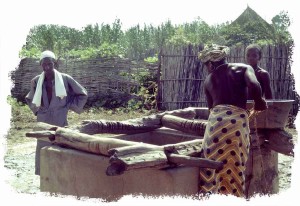From: Tubob: Two Years in West Africa with the Peace Corps
The UN well in front of our compound was a popular watering hole for all of Mansajang. Although the village proper did have a water spigot, it often didn’t work and when it did, people complained of the water’s taste. All day long, women and girls came to the UN well to fill their tubs and pails of water, carrying the heavy loads on their heads as they returned to their compounds.
Because washing clothes has such a high demand for water, many women washed clothes right there at the well, then carried their clean wet clothes home to hang on their compound fencing. They used the local soap, OMA, made from peanut by-products. My husband Bruce became concerned about soap residue filtering through the soil into the well water.
He made a circle of rocks around the well a safe distance away and asked the women to wash clothes outside the circle and explained that this would keep the well water clean. It made more work for them, having to haul their heavy tubs farther from the water source, but they obliged him when he was there, and promptly went back to their former habits when he wasn’t. Bruce patiently reminded them with good natured banter. The problem, of course, was that the women didn’t understand they were jeopardizing their own water supply.
One evening a man from Mansajang called on us and asked Bruce to talk to the village about safe water. Probably, this particular man was sent because he could speak English. Apparently the village elders had gotten wind of a problem with the well and wanted everyone to understand. Delighted, Bruce accepted his invitation.
“What time should we be there?” I asked.
Surprised with the question, the fellow answered, “After evening prayers. You’ll hear the drum.” Gambians had a different sense of time than we did. Watches or even clocks were rare. Activities centered around Muslim call of prayers five times a day. When it was time, people, mostly men, stopped what they were doing, brought out their prayer mats, faced Mecca to the east, and prayed.
A word about the drums. Three basic types of drums are common in The Gambia: the rhythm drum, used for dancing; the ceremonial drum, used for more serious things such as funerals or other somber events; and the talking drum. The talking drum has a sort of “boink, boink” sound to it with varying pitches. People understand the talking drum, as they understand their language, whether it be Mandinka, Wolof, or any of the tribal languages. The talking drums provide tremendously efficient communication, especially in areas where there are no telephones
Knowing that we would hear the drum, we agreed to be at the village meeting place.
Sure enough, we heard the drum soon after we’d finished our dinner. We walked to the center of Mansajang, perhaps a half mile away. The meeting place, a raised platform under a giant baobob tree, was devoid of people. One lone person walked by. In Mandinka, I greeted the man, then said, “Where are the people?”
“The people aren’t here.” Such a typical response. I never got used to it. The man resumed his walk.
“But we heard the drum. We are here for the meeting,” I called after him.
He turned to look at me, shook his head and tsked. “The drum said there was no meeting.”
Apparently one of the village’s important people couldn’t attend so the meeting had been postponed.
Gambians found it hard to believe that we could understand, or “hear,” Mandinka, but we couldn’t “hear” the drums. I’m sure in their eyes we were so hopeless.


